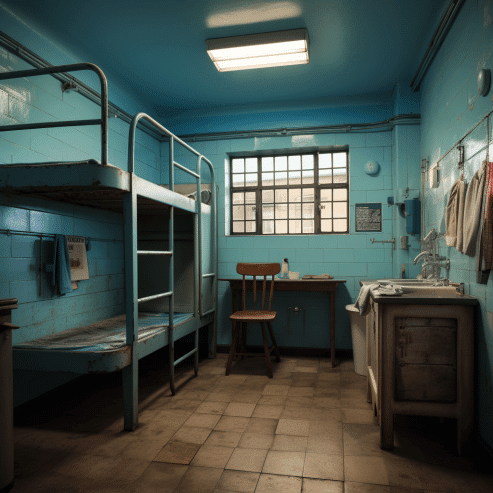Do UK Prisoners Get Their Own Cell?
Do UK Prisoners Get Their Own Cell?
The question of whether prisoners in the UK get their own cell is complex and the answer varies depending on the specific prison, the category of the prison, its current population, and the individual circumstances of the prisoner. Here’s a comprehensive overview of the situation:
Do UK Prisoners Get Their Own Cell?
Cell Allocation by Default: Traditionally, many prisoners in the UK are allocated single cells. However, due to rising prison populations and constraints on prison space, it’s not uncommon for two prisoners to share a cell, which is termed as “doubling up.” Some cells may even accommodate three prisoners.
Prison Categories and Cell Allocation: The UK prison system is segmented into different categories, from Category A (for those who pose the highest risk to the public) to Category D (open prisons for those considered low risk). The type and allocation of cells can vary depending on the category. High-security prisons are more likely to have single-cell accommodations, although this is not a hard and fast rule.
Cell Sharing Risk Assessment (CSRA): Before placing two inmates together in a cell, the UK prison system carries out a CSRA. This assessment determines the potential risks involved in cell-sharing, considering factors like the likelihood of violence, vulnerabilities, and other behavioural indicators. If a prisoner is deemed to be at high risk of harming a cellmate, they are more likely to be allocated a single cell.
Overcrowding: Overcrowding has been a significant challenge for the UK prison system for many years. Due to this, many prisons operate above their Certified Normal Accommodation (CNA), which is the official measure of how many prisoners a jail can comfortably accommodate. This has led to an increased incidence of cell-sharing.
Single Cells for Specific Needs: Some inmates might be allocated a single cell due to specific needs or circumstances. This can include health conditions, mental health concerns, or if they are at risk from other inmates.
Rights and Welfare: Concerns have been raised by prison reform advocates, inspectors, and human rights groups about the implications of doubling up, particularly when it comes to the rights and welfare of prisoners. Issues like reduced privacy, increased potential for conflict, and the spread of infectious diseases are among the concerns associated with cell-sharing.
Future Developments: The UK government has recognised the challenges posed by overcrowding and has, in the past, proposed measures to increase prison capacity, modernise facilities, and address the root causes of reoffending. The extent to which these measures will affect cell allocation in the future remains to be seen.

Do UK Prisoners Get Their Own Cell?
In conclusion, while many prisoners in the UK might ideally have their own cell, practical realities like overcrowding and infrastructure constraints mean that cell-sharing is not uncommon. The system tries to manage this situation through risk assessments and monitoring, but challenges persist.
Your Prison Accommodation
Where Will You Reside?
Upon entering the prison, you’ll be given a room, typically referred to as a cell. This room might be part of a block or wing. Your stay in this room isn’t permanent; depending on the duration of your sentence, you might be moved to another wing or even another prison.
If you’re identified as particularly vulnerable, you might be placed in a ‘vulnerable prisoners unit’ (VPU). If you ever harbor self-harming thoughts, please alert a staff member. In response, you could be moved to a safer cell or paired with a ‘listener.’

Will Your Cell Be Shared?
You might share your cell with another inmate or, in some cases, more than one. Non-smokers shouldn’t be paired with smokers, and according to Prison Rule 7, remand inmates shouldn’t share cells with convicted inmates, unless there’s mutual consent. Every prisoner in a shared cell undergoes a risk assessment. Furthermore, the number of inmates in a cell shouldn’t exceed its specified maximum.
Living Conditions: What to Expect
Your prison accommodation will:
- Suit the number of occupants.
- Be well lit, heated, and ventilated.
- Provide constant access to water and sanitation.
- Allow communication with prison officers anytime.
‘Uncrowded accommodation’ indicates a cell occupied as certified, whereas ‘crowded accommodation’ exceeds the certified number. For instance, a single-occupancy certified cell becomes ‘crowded’ when modified for two.
There are specific standards regarding cell conditions. Your cell should be clean and well-maintained. Necessary items such as bedding, lighting, heating, and ventilation should meet specified standards. Prisoners should always have access to sanitation.
Other In-Cell Amenities
Your cell will be equipped with essentials, such as a bed, mattress, toilet brush, and more. Depending on the cell’s occupancy, furniture quantity might vary. You’re entitled to proper bedding according to Prison Rule 27. Lighting should be adequate with proper electric and natural light sources. Heating systems should function correctly, and the room should be well-ventilated.
If your accommodation fails these standards, you’re encouraged to raise the issue with staff or file a complaint.
Sanitation and Washing
You must always have access to sanitation, either in your cell or in communal facilities. When using the toilet, you should expect a degree of privacy. Prisoners should access washing facilities, at a minimum, weekly. The specifics may vary, but the principle is that you should maintain personal hygiene.
General Wing Maintenance
Both personal and communal spaces in prison should be kept clean and in good repair. Cleaning schedules should be consistent, ensuring cleanliness and orderliness. If the prison has communal dining, the areas should be cleaned promptly after meals. Issues like pest infestations should be addressed immediately.
Prison Kit
Upon arrival, you’ll receive a prison kit containing essentials. This kit varies slightly for male and female inmates but generally includes clothing, shoes, bedding, and sanitary products. You’re entitled to a full kit exchange weekly or an immediate replacement if items are soiled or damaged.
Remember, you have rights as an inmate. While prison is a place for correction, it should also uphold your basic human rights and dignity.




